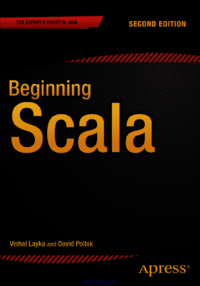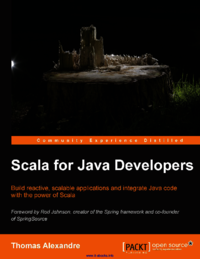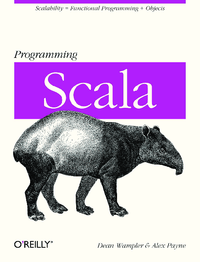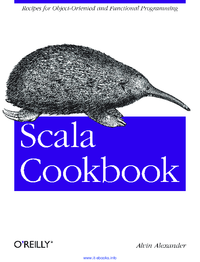Usuario "asielalonso"
Se han encontrado 4 Coincidencias
Beginning Scala, 2nd Edition
Programación en Scala
96 Visitas | 110 Descargas | 2016-01-05 19:44:46 | asielalonso
The first step in writing Scala is not being afraid of the fact that Scala’s going to warp your brain. The next step in writing Scala is accepting that your code is going to look like Java, Ruby, Python, whatever code for a while. It will take you time and effort and more time to code Scala using the idioms in this book. It will take you time to design code that fits into Scala paradigms and to discover and devise paradigms of your own. It will take time but hopefully less time than it took me. This book is for you. It’s my attempt to show you a different way of thinking about and writing code. I hope that you’ll enjoy our journey through Scala together. I hope that by the end of this book you’ll have a new perspective on coding. I hope that you’ll be writing better code and fewer lines of code yet are happier about the code that you’re writing. So, come along. Stick that little toe in the Scala waters and see if they feel as good for you as they have for me.

Scala for Java Developers
Programación en Scala
114 Visitas | 123 Descargas | 2016-01-05 19:49:08 | asielalonso
As a Java developer, you must have heard a lot about Scala, even if you haven't yet written any Scala code. You must have noticed that Scala is becoming popular and heard vigorous debate about it. As I sat down to write this, I typed "scala is" into Google. The top completions included "scala is awesome", "scala is too complex", and "scala is hard." Understandably, you may be confused by such polarization. You may also have heard arcane, possibly off-putting details about obscure Scala idioms and advanced functional programming. What you probably have not heard is a methodical, impartial attempt to answer questions such as "might Scala make me more productive in my daily work?", "will it be easy for me to pick up Scala?", and ultimately, "Should I switch from Java to Scala?".

Programming Scala
Programación en Scala
111 Visitas | 99 Descargas | 2016-01-05 19:52:05 | asielalonso
When I discovered Scala some years ago, the thing that made the biggest impression on me was its composability. Through some very elegant design choices and simple yet powerful abstractions that were taken from the object-oriented and functional programming worlds, Martin Odersky has managed to create a language with high cohesion and orthogonal, deep abstractions that invites composability in all dimensions of software design. Scala is truly a SCAlable LAnguage that scales with usage, from scripting all the way up to large-scale enterprise applications and middleware. Scala was born out of academia, but it has grown into a pragmatic and practical language that is very much ready for real-world production use. You are about to learn how to write reusable components using mixin and function composition; how to write concurrent applications using Scala’s Actors; how to make effective use of Scala’s XML/XPath support; how to utilize Scala?s rich, flexible, and expressive syntax to build Domain-Specific Languages; how to effectively test your Scala code; how to use Scala with popular frameworks such as Spring, Hadoop, and Terracotta; and much, much more. Enjoy the ride. I sure did.

Scala Cookbook
Programación en Scala
132 Visitas | 127 Descargas | 2016-01-05 19:55:56 | asielalonso
Save time and trouble when using Scala to build object-oriented, functional, and concurrent applications. With more than 250 ready-to-use recipes and 700 code examples, this comprehensive cookbook covers the most common problems you'll encounter when using the Scala language, libraries, and tools. It's ideal not only for experienced Scala developers, but also for programmers learning to use this JVM language.
Contribuir
Usted puede contribuir con Libros UCLV, es importante para nosotros su aporte..
Contribuir